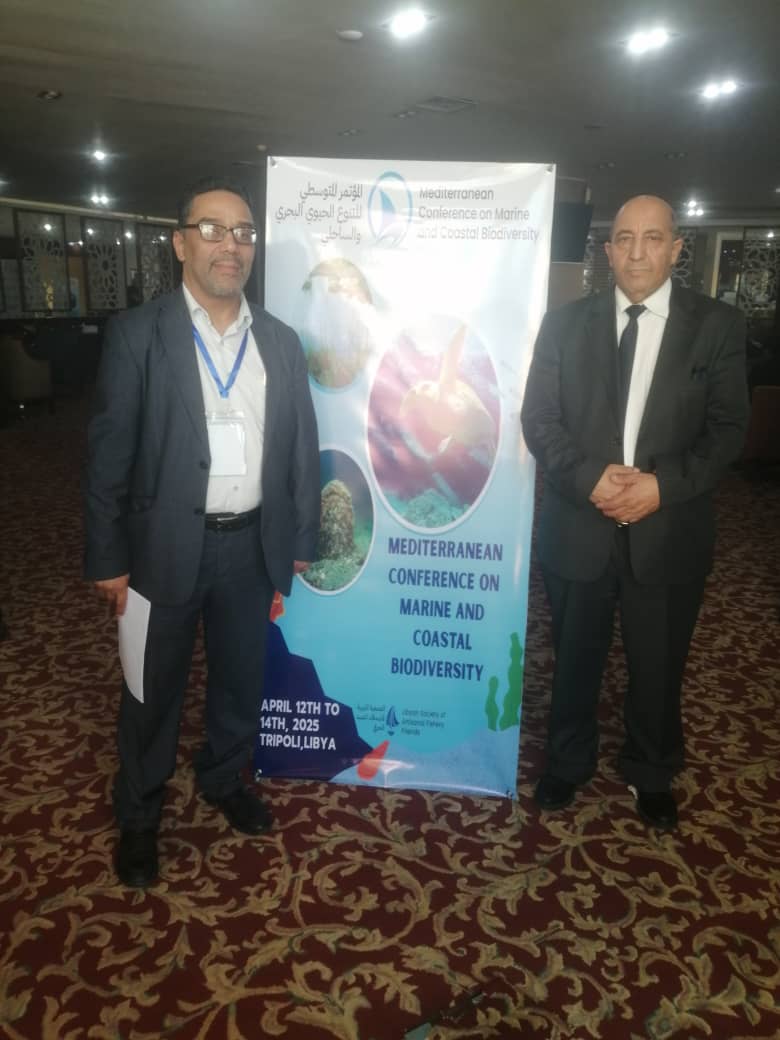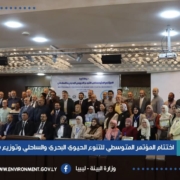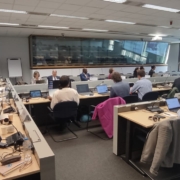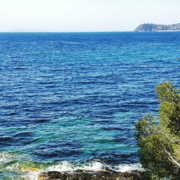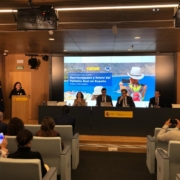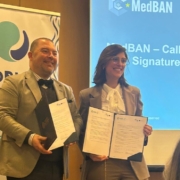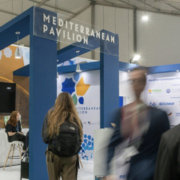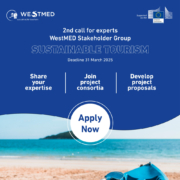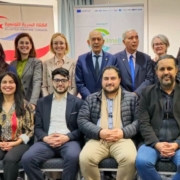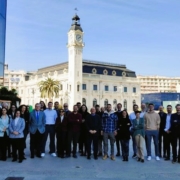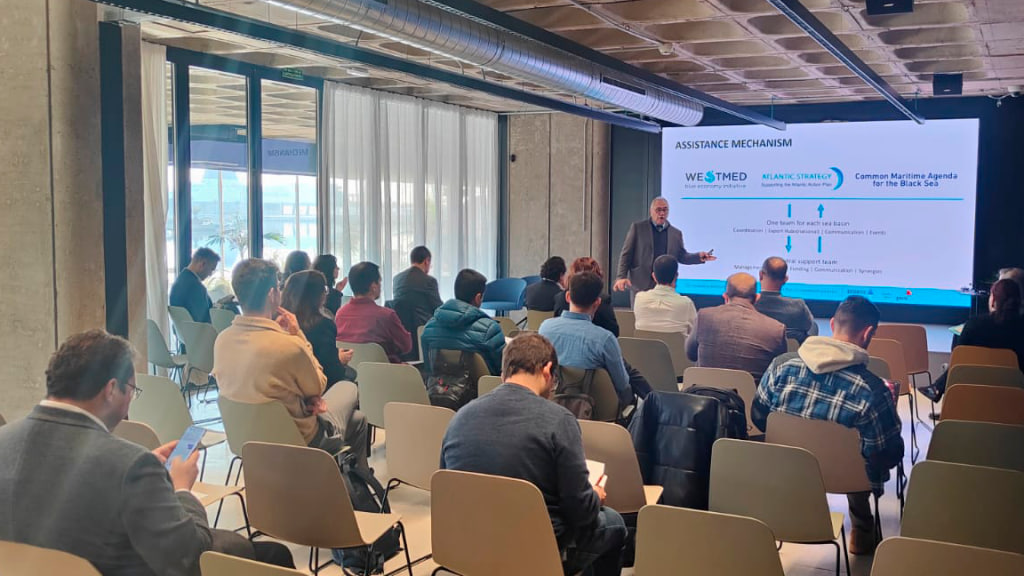On 12 March 2025, the Spanish National Event of the WestMED Initiative took place in Madrid at the Ministry of Foreign Affairs, European Union and Cooperation.
The event, from 9:00-14:00 CET, gathered around 56 participants from various sectors of tourism activities, from consultants, to hospitality, tour operators, service and products providers, marketing, maritime tourism businesses, recreational sectors, regional tourism authorities, and fisheries sector amongst others.
In terms of representativeness, the event was attended by stakeholders from all coastal Autonomous Communities from Spain, excluding Ceuta, Melilla and Cantabria. Most participants came from the Madrid region, but the event also gathered participants from Andalucia, Valencia, Balearic Islads, Murcia, Canary Islands, Galicia, Cataluña, Basque Country and Asturias.
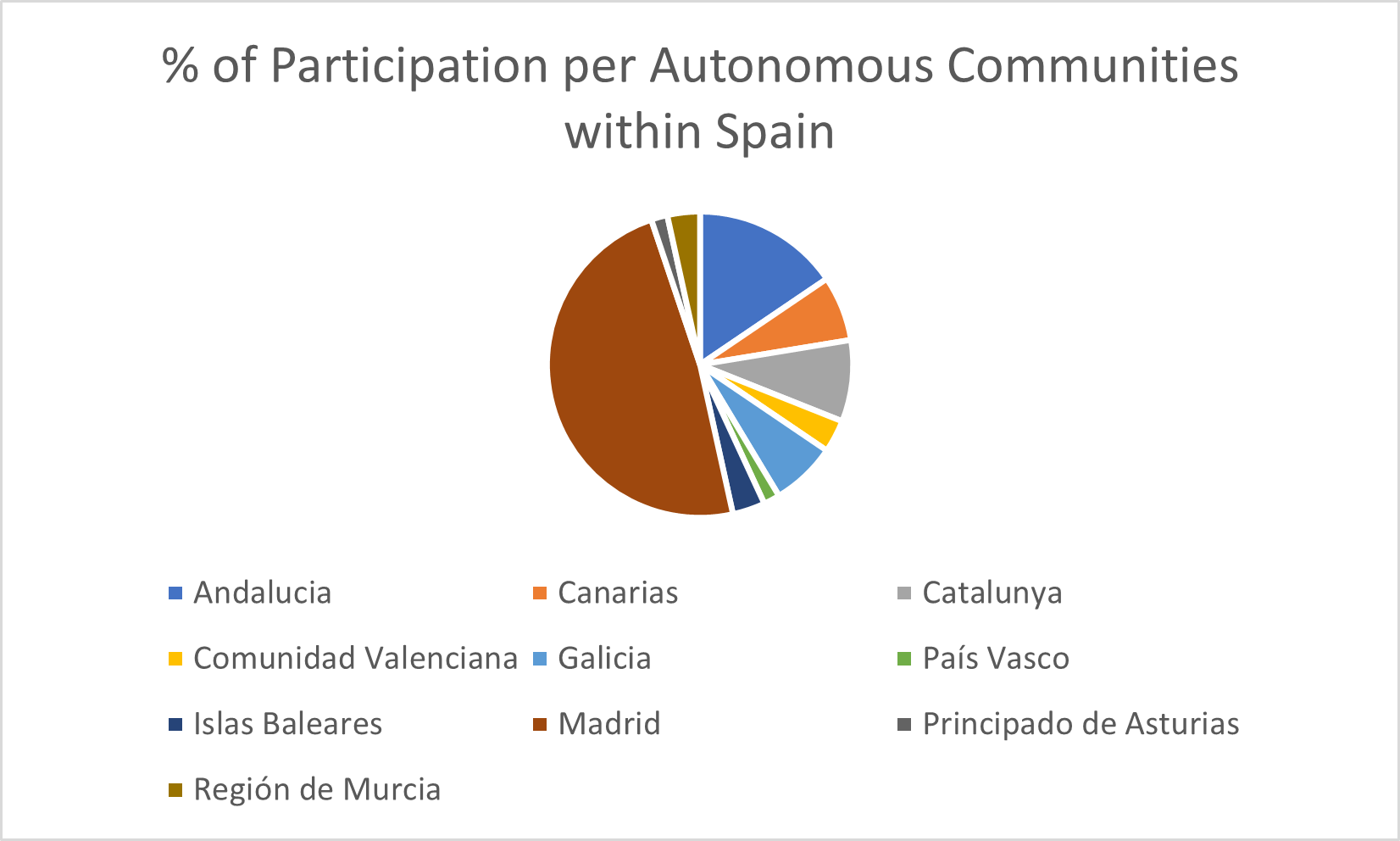
Event Objective
The event had the objective of presenting and discussing about current and future opportunities for Blue Tourism within Spain. To steer this conversation, main initiatives and ministries were invited as speakers to present the work they are doing regarding sustainable tourism within Spain. Two projects (one funded by the EU and a national one) were also invited to showcase how they are also advancing towards these blue tourism efforts.
Opening
The event started with some opening and welcome words from Mr. Antonio Rodríguez de Lievana Sahagún, Director General of Coordination of Internal Markets and other Communitarian Policies from the Ministry of Foreign Affairs, European Union and Cooperation (MAUC). Mr. Rodríguez de Liévana, expressed the views from the Ministry of Foreign Affairs, European Union and Cooperation with regards to blue economy as the ministry is very aware that the activities linked to the sea must be sustainable from the social, economic and environmental point of view and that they represent a valuable source of wealth and a fundamental asset for the settlement of the population. He then continued to explain that the event gathered representatives of the different administrations and other actors of the blue economy with the aim of having the opportunity to talk to each other about the challenges we face and the tools we have available to reach these blue economy objectives.
With regards to blue tourism, Mr. Rodríguez de Lievana, expressed the wish for a promising future for blue tourism in Spain, with a growth potential that could benefit both the local economy and environmental conservation, if managed in a responsible and sustainable manner. He also mentioned “With the right approach, this type of tourism can become an engine of economic development in coastal regions, as long as the balance between the enjoyment of natural resources and their preservation is respected.”
WestMED Initiative
After these opening words, the WestMED Initiative was presented by the National Hub from Spain for the WestMED Initiative, Mrs. Marta Pascual, who highlighted the efforts that WestMED Initiative is doing with regards to developing a sustainable tourism activity within the Mediterranean Sea. Mrs. Pascual also explained the recent developments of the newly constituted Technical Group on Sustainable Tourism within WestMED and presented some of the tasks, activities and achievements obtained by this technical group so far.
Sea Basin Strategies
The event was followed by an intervention from Mr. Javier Fernández, from ECORYS and Coordinator of the three of the Assistance Mechanisms of the EU Sea Basin Strategies. Mr. Fernández explained further opportunities, synergies and cooperation mechanisms that currently exist; not only within each of the Sea Basins, but also between the three Sea Basins (Western Mediterranean, Atlantic and Black Sea and potentially also with the new Greater North Sea Initiative). He also mentioned opportunities to link with the Union for the Medieterranean (UfM) and other Mediterranean Governance efforts.
UfM Study
Mr. Fernández talk was followed by an intervention from Mrs. Irene Alonso from ECORYS, who presented the latest findings from the study on the Implementation Roadmap of the Ministerial Declaration on Sustainable Blue Economy 2021. She highlighted those findings within the study related to blue tourism and highlighted that, despite being an important sector within the Mediterranean, many future opportunities are also envisioned.
Blue Book presentation
The event continued with the presentation of the “Blue Book” of Sun&Blue Congress by the Director of the congress, Mr. Tim Ott Reuter. This book is the compilation of the main outputs, messages and points that were raised during the 2nd edition of the Sun&Blue Congress, which highlights all the topics that need to be aligned to obtain a real sustainable tourism (from energy, to water management, hospitality sustainability, diversification of experiences, efficiency of the processes, etc.).
After these intro speeches, the event had a short 30 min coffee break after which it was the turn of the various Ministries representatives to offer their perspective and knowledge on how blue tourism was addressed within their respective institutions.
Touristic offers in Spain
The first of the Ministries to take the floor was the Ministry of Industry and Tourism. Mrs. Ilona Shekyants Kazaryan, Subdirector general of sustainable touristic developments, mentioned the various efforts that MINTUR is doing with regards to promote and develop sustainable practices, activities and experiences within the touristic offers of Spain. She also mentioned the funding calls that the Ministry has launched within “Experiencias Turismo” for further advancing and developing some of these sustainable ideas into tourism products and offers.
Pesca Tourism
After Mrs. Shekyants intervention it was time for Mr. Manuel Pablos López, Subdirector general of economic sustainability and social affairs from the General Secretary of Fisheries from the Ministry of Agriculture, Fisheries and Aquaculture. Mr. Pablos López explained the efforts that within the MAPA they are developing towards pesca-tourism and maritime tourism activities. Both activities being of tourism, but having the fisheries sector, their traditions and culture always as driver of those tourist offers. He also highlighted the funding opportunities that exist for blue tourism activities within the EMFAF funding opportunities.
Spanish Maritime Cluster
After these two ministries speeches it was the turn for the Spanish Maritime Cluster to present the activities, they are developing and supporting with regards to sustainable tourism. Mr. Vicente Capell, explained the efforts the cluster was supporting with regards to the recreational tourism activities, decarbonization of recreational vessels and nautical ports, etc.
Tourism and MSP
Blue Tourism, being a maritime activity that occurs at Spanish coastlines and maritime spaces, also requires some allocation of space within the maritime spatial plans. As such, the event was followed up by the interesting intervention of Mrs. Aurora Mesa Fraile, Chief of the Maritime Spatial Planning from the Ministry of Ecological Transition and Demographic Challenge, who explained how the Spanish maritime spatial plans have been designed, what are their next steps and how the blue tourism sector has been incorporated into the needs and designs of these plans.
Blue Tourism Project examples
The event closed with the presentation of two interesting projects that deal with blue tourism within Spain. One from the Atlantic fringe and another one from the Mediterranean perspective.
Mrs. María Cardeiro López, manager of FUNDAMAR (Fundación para la Pesca y el Marisqueo) and Project manager of FISATUR (Red Atlántica de Experiencias Turísticas para la promoción del patrimonio cultural marítimo pesquero), explained the project´s objectives, main achievements and future activities.
Mrs. Nayra Irga Pérez Sánchez and Shonia Cruz, from REDDETUMAR, presented the Red Nacional Turismo Marinero, a national network of maritime tourism activities within Spain that aims to gather all maritime tourism activities, offers and developments to serve as a real diversification option for fishermen to earn some extra income.
Concluding remarks
The concluded by Mr. Omado Collado Díaz and Mrs. Rosa Bernardo, both National Coordinators from the WestMED Initiative and the Atlantic Action Plan, respectively, and from the Ministry of Foreign Affairs, European Union and Cooperation (MAUC). They both thanked those present at the event and highlighted the efforts that the WestMED Initiative is and will keep doing with regards to advancing on sustainable tourism opportunities within the blue economy in Spain.
Main next steps
- Encourage an interministerial communication within all Ministries dealing with sustainable tourism topics within Spain (MAUC, MAPA, Hacienda, MITECO, etc.)
- Encourage communication and connections between sustainable tourism stakeholders within Spain.
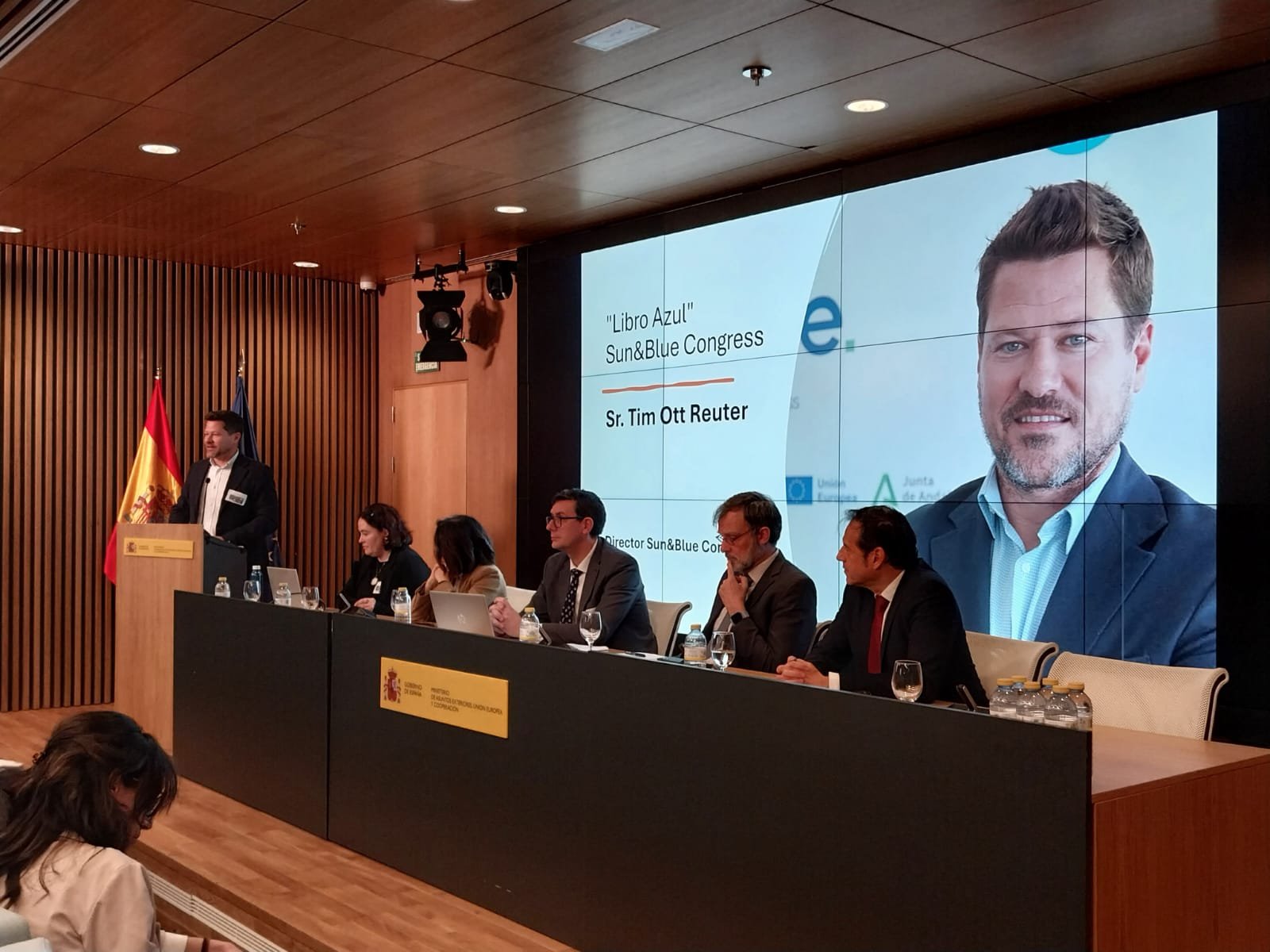
Click here for the full agenda and event annnouncement page (in Spanish)
Links to media coverage
https://x.com/WestMedStrat/status/1896953392075026552
https://www.turismomarinero.com/evento-westmed-oportunidades-y-futuro-del-turismo-azul/
https://winbigproject.eu/events/28/national-event-westmed-opportunities-and-future-of-blue-tourism-in-spain
https://www.linkedin.com/posts/sun-blue-congress_sunandbluecongress-turismo-turismoazul-ugcPost-7305540744797159424-Msv-?utm_source=share&utm_medium=member_desktop&rcm=ACoAAAhRFRwB4YBy4noC0QYjbj0Fkc0NLtEmRK4
https://regp.pesca.mapama.es/visibilidad/eventos/evento-nacional-iniciativa-westmed-oportunidades-y-futuro-del-turismo-azul-en
https://www.linkedin.com/posts/marta-pascual-51088b3a_evento-nacional-iniciativa-westmed-oportunidades-activity-7303707516566138884-MApq?utm_source=share&utm_medium=member_desktop&rcm=ACoAAAhRFRwB4YBy4noC0QYjbj0Fkc0NLtEmRK4
https://www.linkedin.com/posts/marta-pascual-51088b3a_evento-nacional-iniciativa-westmed-oportunidades-activity-7302361086945583105-Ke8E?utm_source=share&utm_medium=member_desktop&rcm=ACoAAAhRFRwB4YBy4noC0QYjbj0Fkc0NLtEmRK4
https://www.linkedin.com/posts/marta-pascual-51088b3a_evento-nacional-iniciativa-westmed-oportunidades-activity-7302361086945583105-Ke8E?utm_source=share&utm_medium=member_desktop&rcm=ACoAAAhRFRwB4YBy4noC0QYjbj0Fkc0NLtEmRK4
https://www.linkedin.com/posts/sun-blue-congress_agenda-eventos-nacional-westmed-12-de-marzo-activity-7302967512361558016-dt_5?utm_source=share&utm_medium=member_desktop&rcm=ACoAAAhRFRwB4YBy4noC0QYjbj0Fkc0NLtEmRK4
https://www.linkedin.com/posts/fundacion-fundamar_fisatur-turismoazul-westmed-activity-7305594957380173824-RgYI?utm_source=share&utm_medium=member_desktop&rcm=ACoAAAhRFRwB4YBy4noC0QYjbj0Fkc0NLtEmRK4
